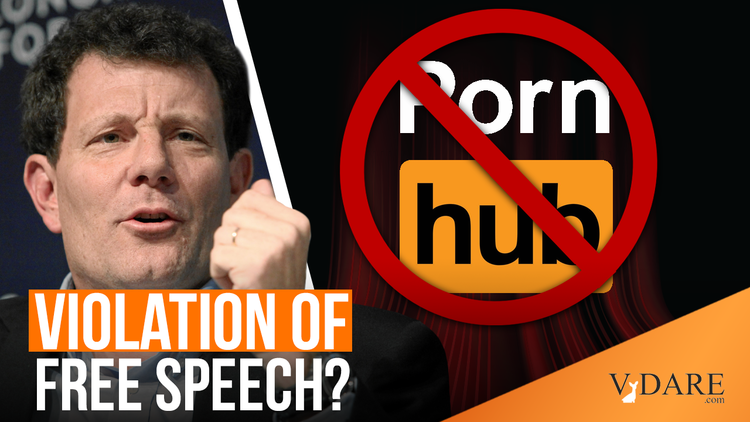


12/12/2020
Censorship of the culturally controversial is not my usual topic of interest. But with pornography, I’m starting to wonder.
The other day Visa and Mastercard yanked services for Pornhub, one of the world’s biggest pornography operations. It was prompted by the occasionally airheaded Nicholas Kristof’s writing: An Uplifting Update, on the Terrible World of Pornhub, December 9, 2020.
I have mixed feelings. Immigration patriotism, white advocacy and other conservative causes know the sting of deplatforming by payment method providers (not to mention every other institution, excluding government).
But porn is bad stuff. If Jesus instructed us to "flee sexual immorality", the ceaseless flow of raw sexual material from the Internet makes it hard to run away fast enough. Children can click on it with ease.
The technical objection is that it’s powerfully addictive. Dopamine gets released, creating compulsions that are difficult to control. Descriptions of the lock porn can put on watchers are alarming.
It can harm relationships, and may disincentivize young men from going out into the world to find actual young women.
Then there’s the issue of the seemingly thousands of people making a life-altering decision by appearing in videos that will last for eternity on the Internet. It’s quite unlike the pre-Internet days when there were a few dozen well-known performers who'd committed to infamy.
Who are all these people? Are they so numerous now that future mates, employers and social media users won’t even notice?
Alt-right circles seem to have taken an anti-porn position, See Another Reason Not to Watch Porn by Hubert Collins, American Renaissance, June 15, 2020, which points out that PornHub (which is, in effect, YouTube for porn) has been using its ill-gotten gains to fund the SPLC!
And here’s The New York Times telling us last year that objections to pornography are the equivalent of mass-murdering anti-Semitism:
Among Some Hate Groups, Porn Is Viewed as a Conspiracy, by By Rob Kuznia, June 7, 2019
Nicholas Kristof excluded, obviously.
Legally, there aren’t the First Amendment concerns you might think. "Obscenity" is a perfectly legitimate category, and both porn companies and their lawyers know that prosecutors could come for them at any minute. [It’s High Time to Prosecute Obscene P*rnography. Here’s How. FamilyAlliance.com, February 11, 2020]
I've never been convinced that pornography was "speech" in the pure sense of ideas and arguments being conveyed. That’s a bastardization of the liberal jurisprudence of the last half-century.